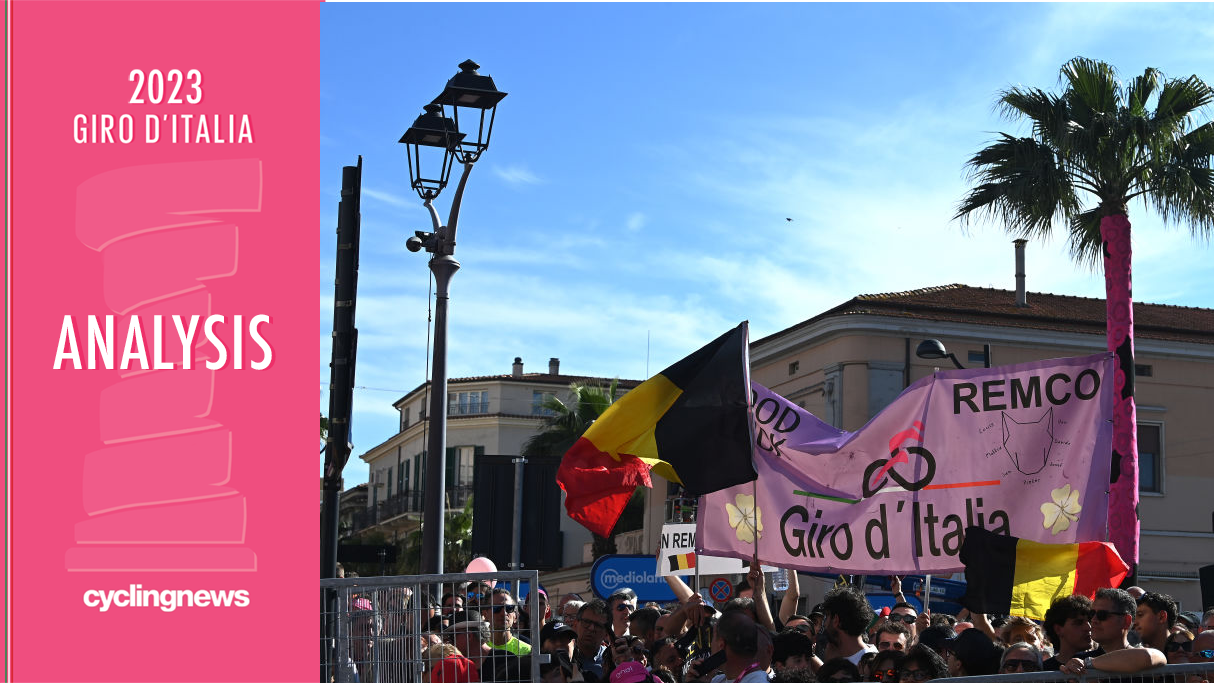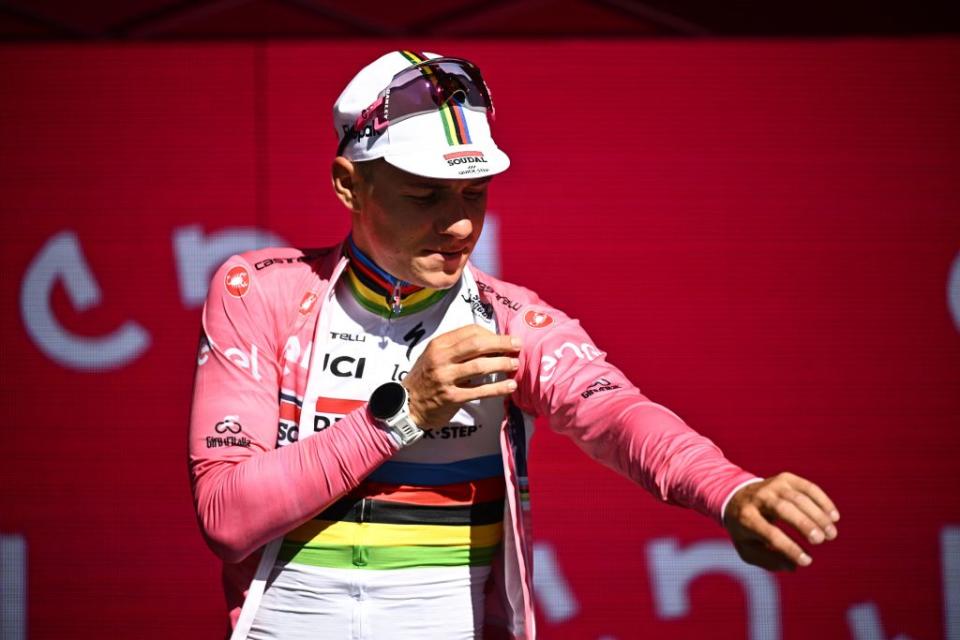Remco Evenepoel’s biggest rival is the Giro d’Italia itself - Analysis

- Oops!Something went wrong.Please try again later.
- Oops!Something went wrong.Please try again later.
The story in Saturday morning’s Het Nieuwsblad had raised a smile at first, but by the time Remco Evenepoel hurtled past the finish line in Ortona shortly before 5:00 p.m., you suddenly started to wonder if there was a faint ring of truth to it after all. Nothing about this young man seems to be ordinary.
Unlike the bulk of his rivals on this Giro d’Italia, Evenepoel elected to wear a short-sleeved skinsuit in the opening time trial after wind tunnel testing had apparently demonstrated his own skin was more aerodynamic than the most advanced fabrics. “It is certainly possible that Remco has ‘fast skin',” the headline had trumpeted.
Whatever it was – the skin, the legs, the bike – Evenepoel was clearly faster than all comers on stage 1 from Fossacesia to Ortona, covering the 19.6km at an average pace of 55.211 kph. He beat Filippo Ganna (Ineos Grenadiers) to the first maglia rosa of the race by 22 seconds, while Primož Roglič (Jumbo-Visma), the man expected to contest the last one in Rome, has already lost 43 seconds.
This was, by any metric, an outsized performance from Evenepoel. His gifts as a rouleur had already carried him to a European time trial title as a neo-professional in 2019 and they formed the bedrock of his Vuelta a España victory last year, but this display was of an altogether different class.
Read more
Giro d'Italia: Remco Evenepoel flies across time trial course for victory and first maglia rosa
Remco Evenepoel hits ground running at Giro d’Italia with knock-out stage 1 ITT victory
As it happened: Giro d'Italia stage 1 time trial dominated by Remco Evenepoel
Subscribe to Cyclingnews for our best Giro d'Italia coverage
Evenepoel was tipped by many to be the best of the general classification contenders in this opening test, but few expected him to deliver such a sound beating to Roglič, who conceded over two seconds per kilometre. Fewer again thought he would end Ganna’s unbeaten run in Giro time trials, but he gained over a second per kilometre on him, even though the uncomplicated route seemed to lend itself squarely to a rider of the Italian’s stature and power.
“We knew he was strong but against Ganna, a rider of 85kg and a champion in this exercise, it’s phenomenal,” Soudal-QuickStep manager Patrick Lefevere said afterwards.
More pertinently with the Trofeo Senza Fine in mind, Lefevere noted that Evenepoel had, in relative terms, given Roglič an even more resounding beating here than he had in the pivotal stage 10 time trial at last year’s Vuelta. “He more or less put him at the same time gap in Alicante, and that was almost twice the distance,” said Lefevere.
Next weekend’s 35km test to Cesena presents itself as a chance for Evenepoel to put an even heftier downpayment on final overall victory, but the Belgian has already banked more time along the Costa dei Trabocchi than he could possibly have anticipated.
João Almeida (UAE Team Emirates) was the best of the GC contenders trailing in his wake, restricting his losses to 29 seconds, with his teammate Jay Vine placing eighth at 46 seconds and Brandon McNulty coming home ninth at 48 seconds.
At Ineos Grenadiers, 2020 Giro winner Tao Geoghegan Hart produced one of the best time trials of his career to take fourth, but he still conceded 40 seconds to Evenepoel. His stablemate Geraint Thomas endured a more disappointing outing, shipping 55 seconds, the same debt racked up by Aleksandr Vlasov (Bora-Hansgrohe).
Further back, there were heavier losses for Jack Haig (38th at 1:36), Thibaut Pinot (47th at 1:43) and Hugh Carthy (57th at 1:56), but the most significant time gap is surely the 43 seconds that separate Roglič from Evenepoel.
They began this race as the consensus joint-favourites and Roglič, of course, remains firmly in contention, but his odds have suddenly lengthened in comparison with Evenepoel’s. This wasn’t exactly the same (revoked) psychological blow that Lance Armstrong dealt Jan Ullrich by catching him for a minute at Noirmoutier-en-l'Ile in 2005, but it’s almost as big a statement as a Grand Tour favourite has delivered in an opening day time trial since then.
Evenepoel’s recent victory at Liège-Bastogne-Liège was not a precise replica of his triumph at La Doyenne in 2022. The manner of his victory there, the unnerving ease with which he forged clear over La Redoute, suggested the 23-year-old had climbed another rung to a new level of performance. His effort here seemed to confirm it, and it’s a sobering thought for Roglič, Ineos and everybody else.
A warning from recent history

And yet… Roglič finished his perfunctory press briefing after the stage with an upbeat statement of fact: “Still 20 stages to go, eh?” Perhaps it’s wise to heed his words; he knows only too well of what he speaks.
On his last Giro appearance in 2019, Roglič was a most dominant winner of the short uphill time trial in Bologna on the opening day, and he handed out another hammering to his rivals on the mountain time trial to San Marino a week later.
At that point, he looked the obvious Giro winner in waiting, only for the hitherto smooth fabric of his race to start to fray. Roglič’s fixation on Vincenzo Nibali, not to mention his unwillingness to carry the weight of the pink jersey for too long, allowed the eventual winner Richard Carapaz to rip clear on the race’s initial foray into the Alps.
That mistake was compounded when Roglič punctured and crashed on the road to Como on stage 15, when his Jumbo-Visma team also botched a bike change in absurd circumstances. By the time Roglič fell ill in the third week, the maglia rosa was already out of reach.
Everybody has a plan until the Giro hits them in the face, in other words.
Evenepoel has the maglia rosa on his back after stage 1 and, all things being equal, he can expect to have buttressed his advantage over Roglič et al by the time the Giro hits the high mountains, but he will encounter ambushes and obstacles of all varieties at various junctures from here to Rome.
The depth of his team will be tested, and, above all, so will Evenepoel’s powers of endurance and his climbing ability. The final week of this Giro offers a level of difficulty that he simply did not encounter at last year’s Vuelta, with repeated stages presenting more than 5,000 metres of total climbing. On days like those, a moment’s weakness can be mercilessly exploited by the delirious circumstances of the race itself, as Simon Yates, absent this year, learned so cruelly on the Finestre back in 2018.
In the pack chasing Evenepoel here, meanwhile, are riders who have experienced first hand how the Giro’s narrative can shift so dramatically across its three weeks. Three years ago, Geoghegan Hart set out as a domestique, dutifully feathering the pedals in the opening time trial in Palermo and losing two minutes. Three weeks later, he was, improbably, a Giro champion after a tumultuous race.
On Saturday in Abruzzo, Evenepoel was a most emphatic winner of the Giro’s opening dash, but he knows the fundamental challenge hasn’t really changed, despite the time gained on Roglič. The race remains a marathon and he must last the distance.

